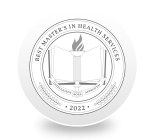
Next Application Date:
08/21/22
Next Term Starts:
09/10/22
Credit Hours
Year Program
Per Credit Hour
Scheduling
Xavier University Online offers professionals an Executive Master of Health Services Administration (MHSA) in a 100% online format. You will join a nationally-ranked program accredited by the Commission on Accreditation of Healthcare Management Education (CAHME). The online Executive MHSA requires no on-campus visits, so you can earn your MHSA degree without interrupting your life and career.
This 42-credit degree program is designed for busy professionals, with at least three years of clinical or non-clinical experience in the healthcare sector, or similar, who are ready to leverage their health care experience and transform the delivery of health care services.
As a student in Xavier’s online Executive MHSA degree program, you’ll be guided by highly skilled faculty and professional health leaders, as you join a class of no more than 20 peers who share your same passion and drive for success.
With health services administration classes offered in the fall, spring and summer, you can unleash your leadership potential and prepare for a top-tier, dynamic role in as few as two years.
Our award-winning Health Services Administration program is the only program in the country to have received three inaugural CAHME Awards:
Xavier University also offers a traditional, on-campus MHSA program, an online Health Services Administration certificate and an online Healthcare Quality and Process Improvement certificate for those applicants who do not yet meet the Executive MHSA requirements. Both certificates act as an entryway with all four courses from the certificates transferring into the Executive MHSA program. Certificate students who wish to progress into EMHSA will have a streamlined application.
Request More Information
By submitting this form, I understand that Xavier University may email me or contact me via telephone, pre-recorded messages, and/or text messages about educational services at the phone number(s) provided, including a wireless number, using an automated technology. I also understand that consent is not a condition of enrollment.
You’ll get the personal attention and flexibility needed to reach your goals at your pace. Our invested professors and small class sizes will set you up for success.
Our Jesuit Catholic values are based on a vision of a world changed for the better, emphasizing service and community engagement in addition to academics.
We offer exceptional online programs at an affordable cost. Numerous financial aid resources are available for our online students, making education more affordable.

in Graduate Health Care Management in the Nation
(U.S. News & World Report)

for Excellence in Healthcare Leadership Development
(CAHME)

in Health Services Degree Programs in the Nation
(Intelligent.com)
Xavier’s 100% online Executive MHSA degree consists of 42 credit hours, which can be completed in approximately two years, with flexible scheduling options available. The knowledge gained from the MHSA program provides students and graduates with the skills necessary to manage, direct, and lead medical and health care organizations such as health systems, hospitals, physician practices, or have leadership roles in insurance, consulting, public health organizations, pharmacies, public agencies, among others.
The online master’s degree in health services administration concludes with a capstone project that aligns with the organization in which a student is working. The project is supervised by a full-time faculty member along with a mentor at their place of employment. Projects must be approved by the faculty advisor and mentor. Students are responsible for securing their project mentors.
This course discusses behavioral theory and its underlying principles as applied to the development of managerial and team work skills for health services administrators.
In this course, fundamental human resource functions are analyzed and their implementation in healthcare organizations are investigated. The unique strategic imperatives and challenges of workforce development in a healthcare organization are explored and various solutions evaluated.
This course applies organizational theories to the understanding and management of the processes by which leaders and their top management teams formulate organizational mission, assess external environments and align internal resources in the implementation of organizational strategies designed to maximize strengths and opportunities and eliminate weaknesses and threats.
This course discusses the nature and application of various quantitative methods for analyzing and improving organizational systems and processes within the healthcare field.
Students will explore the theoretical application of statistical quality management in healthcare, as well as the practical application of quality improvement methods in healthcare settings.
This course introduces students to theory, technology and practical application of information systems. Emphasis is placed on preparing managers to interact with multidisciplinary personnel to design, acquire and maintain information systems for integrated healthcare delivery.
This course examines basic concepts of healthcare reimbursement from both a Medicare and commercial insurance perspective and from a complete health system point of view. Students will explore the shifting landscape from fee-for-service to value-based purchasing models that employers, Medicare and private insurers are gravitating towards. They will also examine the basic components of revenue cycle management that allow providers to turn clinical activity into cash flow to sustain their missions.
This course examines basic principles and techniques used in the financial management of a healthcare facility, with special emphasis on the capital acquisition problems within the healthcare industry and their relationship to external pressures on the industry’s structure.
This course examines special financial management topics in the healthcare industry, such as leasing, refunding debt, risk analysis, outsourcing and merging. Special focus is placed on the management implications of revenue flows under various payment systems within integrated delivery systems and the effects of regulation.
Students are introduced to epidemiologic concepts, skills and data, the application of epidemiology to population health and health services and to the application of epidemiologic literature in health services management through an applied project using a health status analysis. Methods to determine risk factors for health problems are discussed and examined in this project.
This course provides (1) a historical perspective on the development of healthcare services in the US, (2) a description of the key factors and issues which influence the development of the current healthcare delivery systems, (3) a description of the current healthcare delivery systems, including reimbursement and (4) discussion of the future US healthcare system.
This course focuses on how to best allocate scarce resources to optimize the provision of health services and well-being of society and analyze how public and private policies impact various stakeholders.
This course describes the legal climate within which the healthcare institutions operate particularly as they pertain to the activities of healthcare administrators. It introduces the dominant ethical theories and principles in healthcare, relating them to current ethical issues (professional, clinical, social, business and organizational). The course examines the relationships between ethical and legal concepts, and how the two relate and influence each other. This course also provides the opportunity to begin to formulate ethical and legal positions related to contemporary issues and situations in healthcare.
This course integrates the specialized knowledge and skills learned from the previous online HESA courses through the completion of a project relevant to a health organization.
Lorem ipsum dolor ecet eteran liren imaprei deolaon inteerorn lorem iosum dolor ecet ert.
Get Started on Xavier University’s free online application. You can begin the process in just a few clicks.
One official transcript directly from all colleges or universities that you have attended for any undergraduate and graduate course work. Applicants must have a degree from a regionally accredited university. Send transcripts to:
Xavier University
ATTN: Admission Processing Center
3800 Victory Parkway
Cincinnati, OH 45207-5131
For electronic transcripts, send to:
xuadmit@xavier.edu
Executive MHSA students are required to have three years of clinical or non-clinical healthcare experience, or similar.
Two letters of recommendation from professional and/or academic sources, including one from a current or former employer who can assess your potential for success in this program.
The essay should address your career aspirations and how an MHSA degree will assist you in achieving them.
Admissions Interview conducted via phone or video; the interview will be held with the members of the Admissions Committee.
GRE/GMAT scores are not required for admission to the Executive Master of Health Services Administration program.
In some courses, you will use Excel. If you are not comfortable with that, you will be able to take a brief Excel course, at no additional cost, at the beginning of the Executive MHSA program online.
Note: International students who reside outside of the United States cannot be accepted into the online Executive MHSA degree program. International students in the U.S. cannot enroll in an online degree program to fulfill the legal requirement for an F-1 or J-1 visa.
Per Credit Hour
Total Estimated Tuition
The amounts listed are for the 2025-2026 academic year, and include classes from Summer 2025 through Spring 2026. Tuition cost is per credit hour unless otherwise stated.
For the full, official listing, please visit xavier.edu/costs.
Xavier University reserves the right to correct any computational or clerical errors.
Peter Mallow, Ph.D., is currently the chair and director of the MHSA program as well as the director of the HECOR program at Xavier University. His research interests include understanding complex healthcare systems and how decisions are made with respect to uncertainty, value, efficiency and equity. His methodological expertise is in conducting economic evaluations and outcomes research to make explicit the tradeoffs involved in these complex decisions. He has earned several awards for his research and has been published in several leading health services journals. Prior to joining Xavier, Mallow served as the Program Director, Health Economics, Market Access and Outcomes Research for Cardinal Health and Associate Director of Health Economics at CTI Clinical Trial and Consulting. Mallow earned his Ph.D. from the University of Cincinnati where he served as an adjunct faculty member from 2015 to 2017.
Dr. Eileen Steinle Alexander is an Associate Professor in Health Services Administration at Xavier University in Cincinnati, Ohio, U.S.A. She has dedicated her career to demonstrating the value of collaborative team processes & quality improvement, driven by data, regional need and educational excellence. She teaches Epidemiology, Quality Management, Global & U.S. Health Systems, & Health Ethics & Law.
Prior to doctoral study, Dr. Alexander had a successful career as a practitioner in Quality & Risk Management, hospital epidemiology, infection prevention and surgical education, while guiding her hospital through 4 successful TJC IC inspections. During doctoral studies at the UC College of Medicine, she received an NIH-T32 Trainee grant in molecular (genetic) epidemiology of children’s environmental health to study families at risk for diseases caused by shared environment & genetics.
She partners locally and globally to support health improvement. Over 80 Xavier students have completed her Community Service Learning (CSL) courses, many representing Xavier locally, regionally and nationally as “women and men for others.” In 2019, Dr. A was awarded the prestigious Xavier University Research Mentor of the Year Award. Prior awards include numerous grants, as well as the Young Investigator award from the International Eosinophil Society. In 2022, she was awarded the Ignatian Educator of Distinction.
Her publications include twin and family risk modeling for eosinophilic esophagitis, pathology scale development, population stratification bias, systematic review, artificial intelligence systems, community service learning and diversity recruitment.
Kim has over forty years of experience in nursing, and hospital leadership. She is committed to improving the quality of care, the service provided to patients and their families, and the value associated with the care and service in healthcare. Kim strives to deliver results by providing a great place for staff to work and physicians to practice medicine. She is committed to holding herself and others accountable for delivering excellent results.
Kim retired in 2020 after being a CEO of a rural hospital for more than twenty years. In addition, she has been a hospital manager, a Chief Quality Officer, a Chief Operation Officer, and a Chief Nursing Officer. Kim is committed to continual learning. She has experience in teaching and applying the concepts of process improvement to support individual and corporate learning. Kim has a BSN, and an MBA. In addition to teaching at Xavier, she teaches undergraduate and graduate students at Bowling Green State University.
Amber Chere’ Brogden, MHSA completed her undergraduate degree in Communications from the University of Cincinnati in 2003 and her Master of Health Services Administration from Xavier University in 2007. She has served in various leadership and managerial roles and has experience working in interdisciplinary teams, physician practice, revenue cycle, and teaching. She has a passion for improving those in her sphere of influence and is a strong proponent of seeing others reach their maximum potential.
Dr. Rick Browne received his Ph.D. in Counseling Psychology from Indiana University and is a licensed psychologist in the State of Ohio. He teaches courses in ethics, management, professional development and the US healthcare system. He does research in the area of health administration pedagogy and interprofessional education.
Ruben Diaz, MHSA, M.A. CCC-SLP is the Director of Operations for Primary Care at Premier Physician Network (PPN). He graduated with a master’s degree in Speech-Language Pathology & Audiology from the Catholic University of Manizales, Colombia (South America) in 1993. He was an Adjunct Faculty Instructor for the Health Science Department at the same institution and worked as a medical speech pathologist until December of 1998. He migrated to the United States in early 1999 and completed a master’s degree in Communication Sciences and Disorders at the University of Cincinnati. Following his graduation, he became a pediatric Speech Pathologist at Cincinnati Children’s Hospital Medical Center. He was the Clinical Program Manager before pursuing a similar role at Miami Valley Hospital in Dayton, Ohio.
He completed his Executive MHSA degree at Xavier University in 2019. During his tenure at Premier Health, he has been involved in different leadership roles including Project Manager for the Rehabilitation and Sports Medicine Program and a manager for the Physician Relations program.
Ruben has a passion for mentoring and helping others develop their careers within and outside of the organization. He is a recognized local and international presenter of clinical and leadership topics. He is a member of the American Speech-Language & Hearing Association, the Ohio Speech-Language & Hearing Association, and the American College of Healthcare Executives.
Eddie Hooker is currently a Professor in the Department of Health Services Administration at Xavier University in Cincinnati, Ohio. He also is an Assistant Professor in the Department of Emergency Medicine at the University of Cincinnati. His areas of expertise include: emergency medicine, epidemiology, health services management and public health. Dr. Hooker received his B.S. degree from Hampden-Sydney College in Virginia. He earned his M.D. degree from Eastern Virginia Medical School.
He then completed his residency training in Emergency Medicine at the University of Louisville. As a full-time faculty member at the University of Louisville from 1991 until 1996, Dr. Hooker served as Associate Professor and Director of Resident Research. He was very active in brain trauma and stroke research. Dr. Hooker most recently practiced emergency medicine at a private hospital in Cincinnati where he was active in cardiac research. Since 2005, Dr. Hooker has been teaching in the Department of Health Services Administration at Xavier University. In the spring of 2007, Dr. Hooker earned his Doctorate in Public Health from the University of Kentucky. Dr. Hooker continues to be active in emergency medicine and public health research. He has authored more than 20 publications in leading emergency medicine journals, published many book chapters and continues to have an active research agenda. Dr. Hooker serves as an editor for Emedicine, an online clinical knowledge base. He is the medical advisor for Indian Hill Schools. Dr. Hooker lives in Cincinnati with his wife and four children. His hobbies include genealogy and cooking.
Dr. Ashley White is an Assistant Professor in the Department of Health Services Administration at Xavier and an Epidemiologist. She teaches Quantitative Methods and Applied Epidemiology courses. Her research focuses on the geospatial analysis of health services to understand and improve healthcare inequities. Dr. White is from Cincinnati, and she completed her undergraduate degree in Natural Sciences/Biology at Xavier University. She then completed a Master of Public Health, with a concentration in Health Education and Promotion, at the University of Cincinnati and her Ph.D. in Epidemiology at the Medical University of South Carolina. Dr. White worked for the Northern Kentucky Independent District Health Department and Cincinnati Health Department between her masters and doctoral degree programs, and also served as a Research Business Coordinator at the Research Institute at Nationwide Children’s Hospital in Columbus.
Yes, the Executive Master of Health Services Administration is accredited by the Commission on Accreditation of Healthcare Management Education (CAHME).
No, the degree is from Xavier University and is awarded upon meeting coursework standards that are independent of course delivery. You will be awarded a Master of Health Services Administration.
The tuition rate for the online Executive MHSA degree is $704 per credit hour. The total cost of the Executive MHSA program online will vary, depending upon transfer credits awarded, additional fees, and the cost of textbooks/materials. See the Tuition page for more information.
No, the online Executive MHSA courses are charged the same rate as all other courses.
Yes, you can feel confident choosing Xavier University’s online Executive MHSA track. In fact, our MHSA program has a national reputation for excellence and is the only program in the country to have received three inaugural CAHME national awards since 2016. See a list of all of our awards by program on our Rankings page.
Some students believe that online courses will be easier than a face-to-face course. However, that is not true. Each online course at Xavier will have the same academic standards and content as a face-to-face course. You may find online learning to be easier because it suits your learning style, but the course content, the expectations for how much you will learn and the assessment of what you have learned will be just as rigorous as in a face-to-face class.
Students may find that they can get to know their professor/instructor and other students better in an online course than in a traditional face-to-face course. There are many options for interacting with your instructors and classmates in your online program, including group projects, discussion boards, video or audio files, email, and video conferencing. There may be additional opportunities for interaction available based on the course and instructors, such as group projects or other online activities.
Online MHSA classes are designed to be asynchronous, with no set meeting times, but with deadlines. This allows masters students enrolled in classes to progress through them together, share experiences, help improve each other’s skills, and develop their working network. The MHSA classes include activities, such as reading, video lectures, exercises, discussion boards, individual projects, and group projects. No required on-ground meeting is included in the curriculum, but students are welcome to come to campus and meet with faculty.
Xavier prides itself on upholding the value of “cura personalis,” or “care of the whole person,” in its classes. MHSA faculty maintain those values in our online courses by constructing activities that build a sense of community among participants and by making themselves available for questions and instructional support.
Participation expectations vary by professor. Most online MHSA courses will be asynchronous with no set meeting times; however, professors have the option of including mandatory or optional synchronous online sessions in their courses.
MHSA courses are 16-week sessions and it is suggested that students take 1-2 classes per semester and two classes in summer.
You will need to review the syllabus for each course to determine how to obtain materials (print and digital) you will need for that course. The Xavier Bookstore and/or Library will be happy to assist you in finding course materials. Some readings or media lessons may be posted digitally within the online course itself or in Xavier’s E-Reserves system.
If you are new to online learning at Xavier, we encourage you to go through the student orientation for online courses. You can also contact Bobby Rue at ruer@xavier.edu to ask if you could see an online MHSA course.
The Technology Services website offers great resources to support online students.
We encourage you to take advantage of the library’s online resources.
No, the GRE/GMAT is not required for the Executive Master of Health Services Administration program.
The Executive MHSA online program has two start dates per year; new students can begin classes in the fall semester (typically at the end of August) or the spring semester (typically at the beginning of January).
A MHSA degree provides managers, analysts, planners, physicians, nurses, and other health services professionals the skills to manage and lead health departments, facilities, and organizations, through the combination of healthcare management, finance, policy, economics, law, business, and leadership. Xavier University’s online MHSA program is a great option for working health care professionals and other interested individuals due to its flexibility, availability, accessibility, and is a convenient way to expand knowledge and take your career to the next level.
Graduates with a MHSA degree can find careers in a variety of health-related positions. Since the degree is diverse in nature, graduates have the ability to work in management, finance, operations, consulting, insurance, compliance, among others.
The executive MHA (Master of Health administration) and executive MHSA (Master of health services administration) are largely equivalent designations for degree programs that focus on leadership and management for health care organizations and any business related to the health care sector, such as health systems, hospitals, physician practices, health insurance companies, pharmaceutical companies, public agencies, research and development organizations, among others.
The main difference between an executive MHA and MHSA generally has to do with the school or department offering the programs. For example, some programs will require a capstone project while others may require a research-based master thesis, or incorporate an internship or residency. The variations are not based on the name of the program but instead on the program’s approach.
A Master of Business Administration (MBA) degree specializes in the general training of business functions across many different business sectors like manufacturing, service industries, technology, research firms, nonprofits, and start-ups. An MBA does not focus on the health sector and is not centered around improving population and patient health.